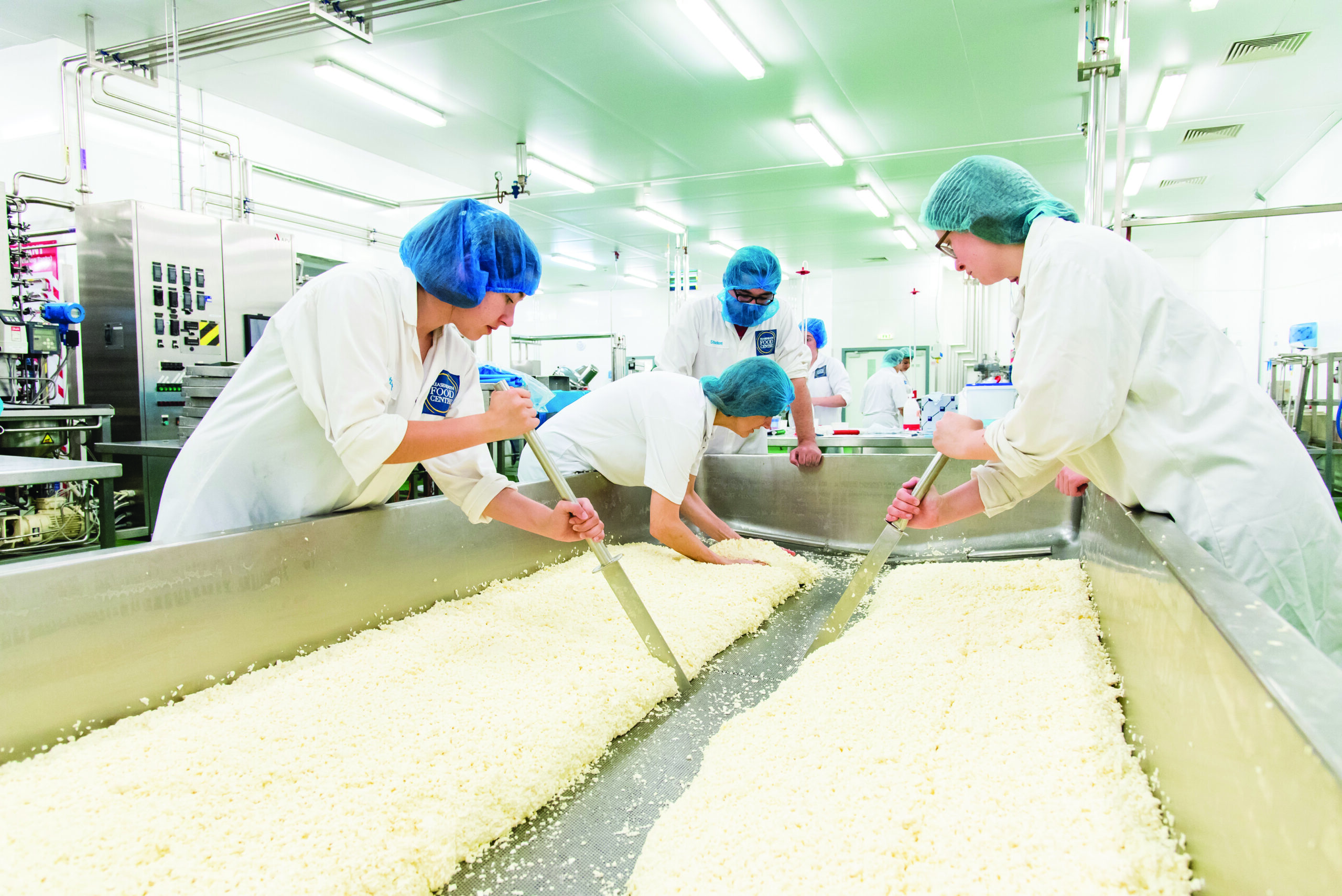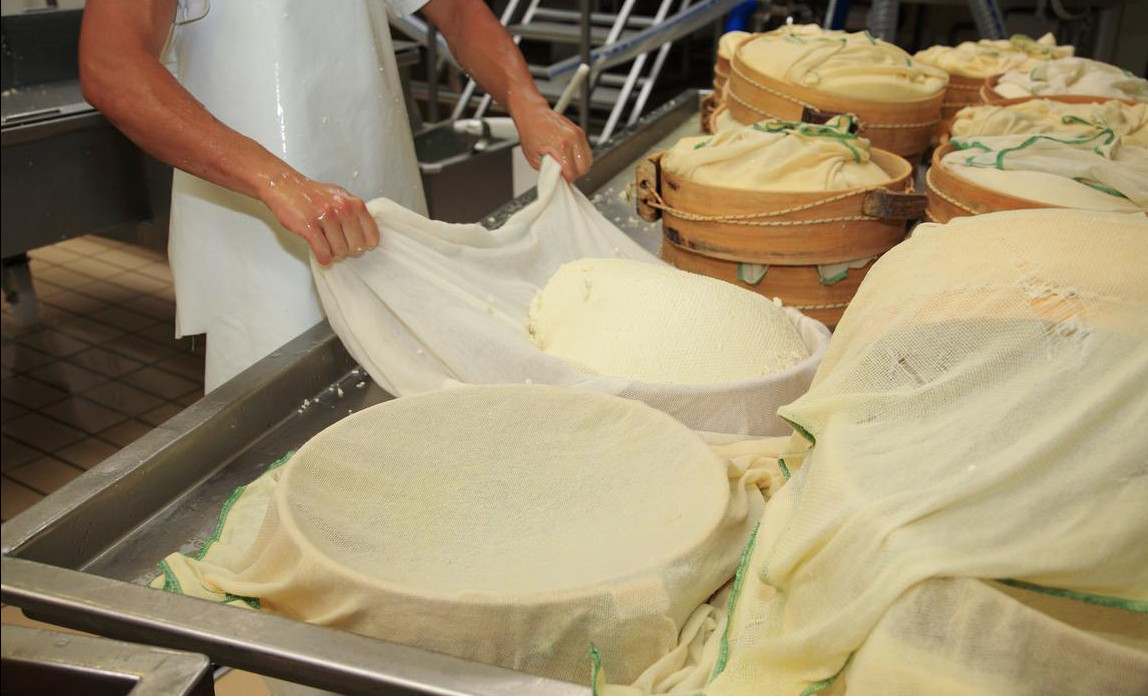Comprehending the Scientific Research Behind Cheese Manufacturing: From Milk Choice to End Product
The elaborate process of cheese manufacturing begins with the cautious choice of milk, an option that exceptionally impacts the last item's flavor and structure. Comprehending the essential function of germs in fermentation exposes exactly how these bacteria transform lactose into lactic acid, a key ingredient in creating the cheese's personality. cheese factory melbourne.
Milk Choice Process
The selection of milk is a crucial action in the cheese production procedure, as it directly influences the taste, structure, and high quality of the final product. Numerous aspects need to be considered throughout this choice, consisting of the source of the milk, the breed of the pets, and their diet regimen. Cow's milk, goat's milk, and lamb's milk each have unique buildings that add to the distinct characteristics of various cheese varieties.

In addition, the nutritional content of the milk, influenced by the animal's diet, can change the cheese's final qualities. High-grade milk, sourced from healthy and balanced pets, ensures a superior cheese product, emphasizing the significance of strict high quality control actions in the milk option procedure. Hence, mindful factor to consider in milk choice is necessary for effective cheese manufacturing.

Duty of Germs in Fermentation
Following the cautious choice of milk, the fermentation process plays a crucial role in cheese production, where bacteria are presented to transform the milk into cheese. The key function of these microorganisms is to convert lactose, the sugar existing in milk, into lactic acid. This acidification not just alters the pH of the milk however additionally plays a vital role in taste development, texture, and preservation of the end product.
Lactic acid germs (LABORATORY), such as Lactococcus and Streptococcus species, are frequently utilized in cheese production as a result of their ability to prosper in milk and their payment to the fermentation process. The metabolic activities of these microorganisms bring about the manufacturing of numerous metabolites, including flavor substances and antimicrobial materials, which inhibit wasting microorganisms and pathogenic bacteria, thus improving cheese safety and security.
Additionally, the fermentation process affects the total characteristics of the cheese, including its scent, taste, and appearance. Different strains of germs can give distinctive flavors and add to the distinct profiles of different cheese kinds. Hence, the option of microbial cultures is an important action in attaining the desired cheese quality and uniformity.
Coagulation and Curd Development
In the cheese manufacturing procedure, coagulation marks a vital change from fluid milk to solid curds. This procedure is commonly matched by the acidic environment developed by lactic acid bacteria, which further help in coagulation by lowering the pH of the milk.
The resulting curds are created as the liquid whey begins to divide. Elements such as temperature level, the quantity of rennet made use of, and the moment permitted coagulation are crucial in establishing the structure and top quality of the curds. Higher temperature levels and longer coagulation times generally generate firmer curds, ideal for more difficult cheeses.
As soon as curds are developed, they are reduced into smaller sized pieces, enabling whey to run away more effectively. This action is essential, as it affects the moisture material and total characteristics of the last cheese item. Proper administration of coagulation and curd formation is crucial for achieving details cheese styles and preferred taste profiles.
Aging and Taste Development
After the curd has actually been created and whey has actually been drained pipes, the following phase in cheese manufacturing is aging, additionally called maturation. This critical procedure considerably affects celebrity's last taste, structure, and aroma. During aging, various biochemical and microbiological improvements take place, influencing the total sensory account.
The aging environment, including temperature and humidity, plays a vital role in flavor development. Enzymes and bacteria present in the Get the facts cheese help with from this source the failure of proteins and fats into smaller molecules, leading to the formation of amino acids, fats, and unpredictable substances. These makeovers add to the intricacy of taste and scent, with unique profiles emerging based upon the details cheese selection.
In addition, the duration of aging is crucial; much shorter aging durations usually yield milder tastes, while longer maturation lead to more robust and nuanced accounts. Variables such as the milk resource, cheese type, and specific aging strategies better boost the diversity of tastes produced. Ultimately, aging is a fragile equilibrium of time, environmental problems, and microbial task, culminating in the unique features that specify each cheese variety.
Quality Assurance in Cheese Manufacturing
Making sure high standards throughout celebrity manufacturing process is essential for supplying a top quality product that fulfills customer expectations - cheese makers melbourne. Quality assurance (QC) encompasses numerous phases, starting from raw milk choice to the final aging procedure. Each stage needs meticulous focus to detail to avoid contamination and guarantee uniformity
During milk option, producers have to evaluate variables such as fat material, pH degrees, and microbial quality. Normal testing for somatic cell matters and bacterial lots is important to ensure the milk's suitability for cheese production. In the production phase, QC actions include checking the temperature, acidity, and rennet task, which significantly influence appearance and flavor.
As cheese develops, constant sensory evaluations and lab evaluations are performed to evaluate taste growth, texture, and total high quality. Any kind of deviations from established requirements demand corrective actions to maintain product stability.
In addition, documentation and traceability are important elements click for info of efficient top quality control, enabling producers to track the cheese from farm to consumer. By carrying out durable QC methods, cheese suppliers can not only boost item quality but also build consumer trust, ensuring their area in an affordable market.

Verdict
In final thought, the science of cheese production includes several essential phases, each considerably influencing the end product. The cautious selection of milk, the necessary function of microorganisms in fermentation, the improvement of liquid milk right into curds through coagulation, and the aging procedure collectively add to the development of special flavors and structures. Furthermore, rigid quality assurance determines ensure that each cheese range meets well-known requirements, therefore improving customer fulfillment and maintaining the honesty of the cheese-making practice.
Comments on “Order Cheese for Sale Online Melbourne's Trusted Cheese Makers”